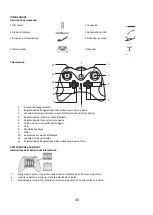
29
HEALTH AND SAFETY PRECAUTIONS
Read the following warning before you or your child play with the Drone. Failing to do so may result in injury.
Repetitive motion injuries and eyestrain
Playing video games can make your muscles, joints, skin or eyes hurt after a few hours. Follow these instructions to avoid
problems such as tendinitis, carpal tunnel syndrome, skin irritation or eyestrain.
Avoid operating for an excessive period of time. It is recommended that parents monitor their children to ensure
they play with the Drone for an appropriate period;
Take a 10 to 15 minute break every hour, even if you don’t think you need it;
If your hands, wrists, arms or eyes become tired or sore while playing, stop and rest them for several hours before
playing again;
If you continue to have sore hands, wrists, arms or eyes during or after playing, stop playing and see a doctor.
Magnets
Not suitable for children under the age of 14. This product contains small magnets. If swallowed, the magnets may stick together
in the intestines and cause serious injury. Consult a doctor immediately if the magnets are swallowed.
Use and maintenance
The QID Tower is not suitable for use by children under 14 years of age.
When flying the QID Tower indoors, install the propeller guards in order to protect the QID Tower in case of a collision with an
object.
You should keep the QID Tower in sight at all times when operating it in order to avoid injuries or damage to people, animals or
property.
The use of the QID Tower in some public areas (for instance train stations, trains, airports, aircraft, etc.) may be prohibited. You
should check whether the use of the QID Tower is permitted before using it in public areas or on public transport.
Always consider other people’s privacy when using your QID Tower.
When rotating, the propellers of the QID Tower can cause injury to people, animals and property. You should not touch the QID
Tower when propellers are rotating and should wait until the propellers have completely stopped before handling the QID
Tower.
You should ensure that no-one is standing closer than 1 meter (1 yard) from the QID Tower when in operation and that at all
times you keep a sufficient distance between the propellers and any person, animal or property.
You must keep the QID Tower away from high voltage power lines, trees, buildings and any other potentially dangerous or
hazardous areas.
The QID Tower’s performance may be affected or significantly reduced and your QID Tower irreversibly damaged if you use the
QID Tower in unfavorable meteorological conditions (including but not limited to rain, wind, snow, fog, etc.) or if visual
conditions are not sufficient (e.g. operating the QID Tower at night).
Other actions that may affect the performance of the drone:
using the QID Tower in wet conditions (e.g. you should not land the QID Tower on water or on a wet surface);
allowing sand or dust to penetrate the QID Tower;
obstructing the engine’s air vents;
using spare parts and accessories other than those specified, or
using the QID Tower near strong magnetic fields, radio signals or areas with strong radiation (this may prevent the
camera of the QID Tower from operating correctly). You should also avoid using your QID Tower in areas with Wi-Fi®
networks (such as near internet Wi-Fi routers or boxes etc.). This may create interference that could reduce the
performance of the QID Tower.
Warning on invasion of privacy
Recording and circulating an image of an individual may constitute an infringement of their rights of publicity and privacy for
which you could be liable. Ask for authorization before filming individuals, particularly if you want to keep your recordings and/or
circulate images on the Internet or any other medium. Do not circulate degrading images or those which could undermine the
reputation or dignity of an individual. The use of the QID Tower for surveillance or espionage purposes is strictly forbidden and
could result in your prosecution under the law. Check whether your use of the cameras on board the QID Tower complies with
the legal provisions on the protection of privacy.
















































